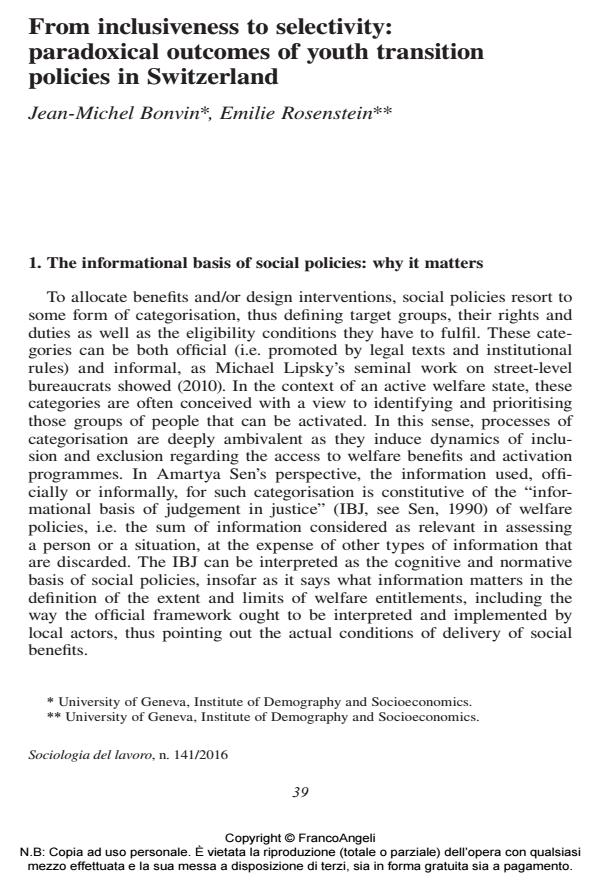From inclusiveness to selectivity: paradoxical outcomes of youth transition policies in Switzerland
Journal title SOCIOLOGIA DEL LAVORO
Author/s Jean-Michel Bonvin, Emilie Rosenstein
Publishing Year 2016 Issue 2016/141
Language English Pages 16 P. 39-54 File size 108 KB
DOI 10.3280/SL2016-141003
DOI is like a bar code for intellectual property: to have more infomation
click here
Below, you can see the article first page
If you want to buy this article in PDF format, you can do it, following the instructions to buy download credits

FrancoAngeli is member of Publishers International Linking Association, Inc (PILA), a not-for-profit association which run the CrossRef service enabling links to and from online scholarly content.
Nel contesto dell’attivazione, gli attori del welfare ricorrono a forme esplicite e implicite di categorizzazione per individuare con maggiore precisione i gruppi che possono essere attivati. Nella prospettiva di capacita, questo tipo di categorizzazione dovrebbe essere sufficientemente flessibile da promuovere la conversione dei diritti in reale capacita di agire. In questa prospettiva, la definizione di una "base informativa del giudizio" (vale a dire i criteri utilizzati per delimitare i di ritti ei doveri delle persone, con l’esclusione di tutti gli altri tipi di informazioni) aperta e la sua applicazione pratica sono caratteristiche fondamentali per valutare potenzialita e limiti delle politiche di welfare. Basato su un caso studio relativo alle transizioni scuola-lavoro in Svizzera, l’articolo mette in luce che, sebbene formalmente aperti, i programmi indagati sfociano in una forte selettivita dei partecipanti e individua i fattori che danno conto di questo paradossale risultato. Parole chiave: politiche per le transizioni giovanili, capacita, basi informative, incompletezza
Keywords: Youth transition policies, capabilities, informational basis, incompleteness
- Deliberative democracy in the real world, the contribution of the capability approach Jean-Michel Bonvin, Francesco Laruffa, in International Review of Sociology /2018 pp.216
DOI: 10.1080/03906701.2018.1477101 - Human beings as receivers, doers and judges. The anthropological foundations of sustainable public action in the capability approach Jean-Michel Bonvin, Francesco Laruffa, in Community, Work & Family /2018 pp.502
DOI: 10.1080/13668803.2018.1526777 - Governing Young Poor in Switzerland and Reinforcing Their Work Ethics Yann Bochsler, in Zeitschrift für Sozialreform /2020 pp.471
DOI: 10.1515/zsr-2020-0020
Jean-Michel Bonvin, Emilie Rosenstein, From inclusiveness to selectivity: paradoxical outcomes of youth transition policies in Switzerland in "SOCIOLOGIA DEL LAVORO " 141/2016, pp 39-54, DOI: 10.3280/SL2016-141003